
Auschwitz-Birkenau, Kastoria City, Lena Russo & Yom HaShoah Commemorations This Year
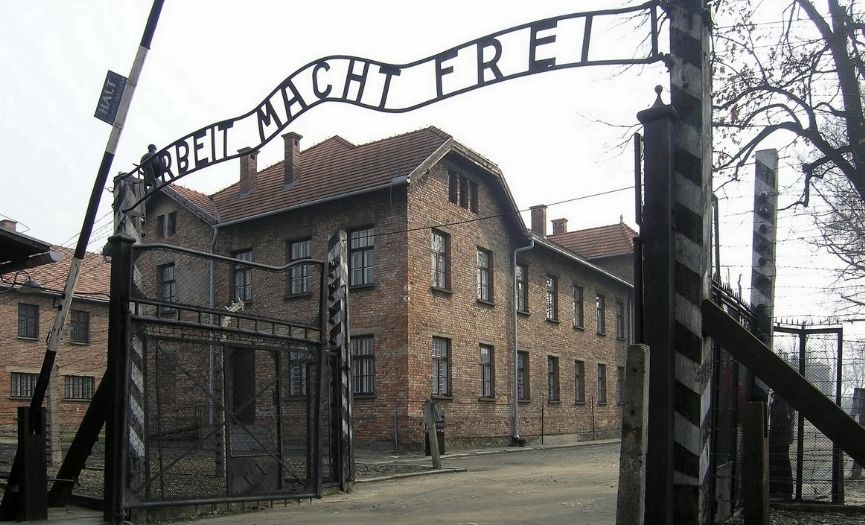
Auschwitz-Birkenau
It is the largest concentration, forced labor, and systematic massacre and extermination camp established by Nazi Germany in the "Final Solution" plan. Between 1940 and 1945, a total of 1.3 million people among them 1 million Jews, were imprisoned from Europe to Auschwitz-Birkenau. (1) 1.1 million people of these were predicted to be killed with 960,000 (2) Jews. Approximately 900,000 people were killed directly in the gas chambers or by shooting as soon as they arrived at the camp. The remaining 200,000 died due to illness, lack of nutrients, maltreatment, and medical experiments. During the Holocaust, concentration camp prisoners were tattooed only at Auschwitz, which were the prisoners' entry numbers. Initially arriving prisoners were given a "camp serial number" sewn on prison uniforms, but as the death rate increased, the bodies became difficult to identify. For this reason, the tattoo system has been adopted. Serial numbers were given only to prisoners selected to work; prisoners who were sent directly to the gas chambers were not recorded and tattooed. Prisoners who died within an average of 6 months were forced to labor at least 10 hours a day under the most severe conditions. While being sent to the gas chambers, they were also doing operations such as cutting hair, collecting corpses, and burning corpses themselves.
Before World War II, Auschwitz - formerly Oscwinchim - was a quiet town of 14,000 people, half of whom were Jews. The name Auschwitz is the symbol of those who were victims of the Holocaust and therefore it became also a symbol of Nazi horror in World War II.
Kastoria City
Kesriye, as it was called in the Ottoman Empire, is located in the northwest of Thessaloniki, Greece. My family settled in Kastoria when they were expelled from the Spanish Inquisition in 1492. At the end of the 1800s, my father's grandmother, with her two children and my grandmother in her womb, settled in Eskişehir, Konya, Adana, and then in Mersin. Her eldest daughter stayed in Kastoria because she got married and had a family there. Born in Eskişehir, my grandmother grew up without ever seeing her eldest sister. There were other separations in the family in later years. The eldest daughter and her family who stayed in Kastoria immigrated to New York City, USA in the early 1900s. The rest of our family stayed in Kastoria. Kastoria, on the border with Albania, is now a peninsula but at that time it was a complete island. Its residents could not have many relations with the outside. At the end of March 1944, the Germans all of a sudden, entered Kastoria via Italy and Albania. 763 Jews, including my family, were first held in a house with the capacity to accommodate 15 people only, and then they were arrested and taken to the Auschwitz-Birkenau death camp. A few people who still remember those days told me the following: "We cannot forget the screams of our Jewish brothers"...
The year 1944 is the year when Jews were killed en masse. While they were separating men, women, and children before, that year they started to destroy families together. Of the 763 Jews sent from Kastoria to Auschwitz, only 30 survived by chance.
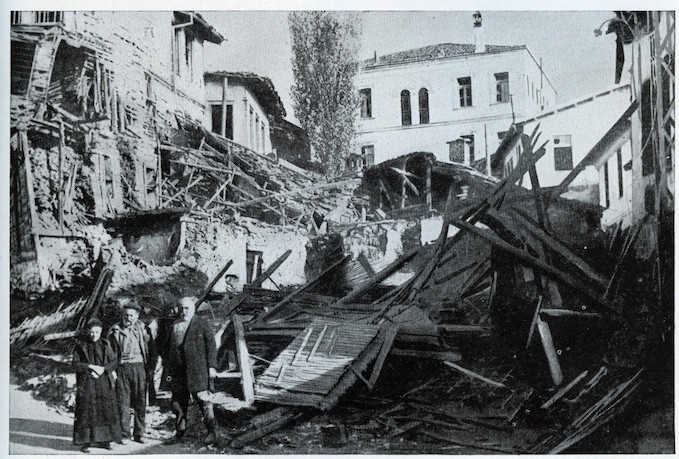
Italians Bombarded Kastoria 3
Wherever I give Holocaust concerts, Holocaust survivors, alone or with their children, or just their children, come to meet me after the concert. We hug and cry in silence for a while… For the first time, I returned with different intense emotions from my Kastoria concert, where I had the honor of commemorating my own family members that we lost in Auschwitz. This time I met their Nazi grandchildren who were members of the "March of Life". These two brave grandchildren, who have been carrying such heavy charges on their backs, came to apologize to both Kastoria and Klissoura, where big sufferance and great brutality had happened, the next day, in front of everyone and the Greek military members. Tina, one of the grandchildren, told me, “Just as the victims never spoke, so did our grandparents completely hide it, we had a hard time until we found out". The most striking of the many intense moments was the confrontation of these two brave grandchildren with Yorgos, who had experienced this brutality as a child and had survived by chance, in Klissoura. Yorgos looked at them first, cried from his heart, then they hugged tightly. Tina, Jürgen, Yorgos… Witnessing these scenes, the sincere sensitivities of the young people I teach, and all the energies they will give to the world give me hope for the future.
Lena Russo...
I met my family who had immigrated from Kastoria to New York in 1992. In recent years, with Cliffton Russo, who is the continuation of the family. Coincidentally I heard a lot about Cliff's beloved mother, Lena, while traveling to Kastoria. Lena is one of the 30 people who could be sent to Auschwitz and come back… Lena, which I have heard both in Kastoria and from everyone who knew her, was the one who embraced people with her never-ending joy of life and huge heart. Unfortunately, when I met Cliff, they had just lost Lena, I couldn't meet her in person. But her light spreads through all of the people who know her.
Lena was born to the Eliyahu family on July 10, 1922, in Thessaloniki. Her mother's name was Alegra, daughter of the Konfino family, and her father's name was Kalef. Kalef; as a multi-lingual, talented, and brilliant businessman, went to America from Kastoria at a very young age. This energetic young businessman, who speaks many languages, has been very successful in America. He met Alegra on a visit to Kastoria, fell in love, and wanted to get married to her. When he asked her to join him in America, where he lived, Lena's grandmother Lea and her grandfather Benjamin rejected this offer, saying "We have only one daughter, we cannot send her to America." Thereupon Kalef returned to Kastoria from America where he had lived for 7-8 years and they got married. Kalef and his five brothers have started a large business with offices in Kastoria, Thessaloniki, and Yugoslavia. Alegra and Kalef moved to Thessaloniki.
“We had a very good life in Thessaloniki,” Lena says in an interview with USHMM 4, “We used to live in a building with my cousins and other good neighbors. A neighbor would cook chicken every Friday for Sabbath dinner, would call my brother Vital and me, in order to offer the chicken livers to us “Vital, Lena, come on, I have chicken liver for you”. Lena explains this memory with a big smile on her face. Over time, Alegra and Kalef had 5 children. One of Kalef's brothers, the one who was in charge of Kastoria, had no children and lost his wife one day. Thereupon, Alegra and Kalef moved to Kastoria with their children. "We had a very happy, peaceful, and good life in Kastoria," explains Lena. She has always missed Kastoria and that life. They lived peacefully with their neighbors of different religions. They lived there very close to her grandmother Lea and Grandfather Benjamin. Uncles, aunts, cousins, a large and happy family...
Lena started her education at Thessaloniki "Lycée Français" and continued her studies in Kastoria. Her favorite activities were dancing, playing the piano, acting and singing. She played a role in a theater play at school and was very successful. Her teacher came to talk to her family, but the family opposed her being an actress and a singer, although they were proud of this aspect of their daughter. Her great-great-grandmother, a very beautiful woman, lived with her grandmother. As she was so beautiful, they used to call her "Moshada", which means very beautiful in Albanian. Even the word Moshada became the family's nickname; "Who are they from?" "They are from Moshadas"... Ladino was spoken in the house, however, unlike other Sephardic Jews in Greece, Kastoria Jews spoke perfectly Greek.
This beautiful life, unfortunately, ended in 1944, when the Germans invaded Kastoria first and the Italians arrived shortly thereafter. While Lena was living in their home with her family, her uncle, and cousins who managed to escape from Yugoslavia, one day the Germans came and used force for them to leave the house and to move to another house. They also burned their house… They confiscated Alegra's father Benjamin's workplace; “Alegra my daughter, today the Germans came and took the keys to my workplace, but don't worry, as always, I will start from the very beginning and I shall succeed. You don't worry about money, we will get over it ”… Some time ago prior to that day, her great-grandmother fell in the kitchen and broke her hip. Granny Lea and the whole family took very good care of the great-grandmother. "My great-grandmother was in her 80s at the time, my grandmother was in her 60s and my mother was in her 40s," says Lena. Finally, the dreadful day arrived, and the Germans began to collect all Kastoria Jews from their homes in order to transport them to the Auschwitz death camp. They left the great-grandmother at home as "she was no use" for them. But the great-grandmother rolled herself up and went to the main door, Lena says, "I don't know how she could do it, there was such a big step, how could she roll herself." When the great grandmother who could come to the main door and shouted, "Do not separate me from my children, take me too", the Germans took her to the Valala house where they kept Kastoria Jews for a few days... The rest is inevitable… Separating the whole family, moving from camp to camp, and finally killing the whole family except Lena and her brother Beni… "72,000 (4) Greek Jews were killed in Auschwitz Birkenau, others in other camps… My little brother Mosiko was 8 years old, my sister Sheli was 6 when they died," says Lena….
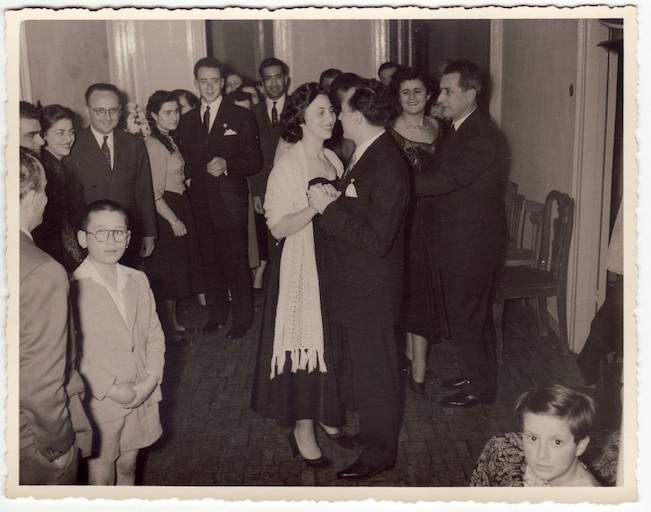
Lena and Maurice, the Wedding Dance
Lena Russo In The Expression Of Her Son Cliffton Russo
Arrival to Aushwitz…
Upon arrival at Auschwitz/Birkenau concentration camp, the Jews arriving from Greece were put into the “Selection” process, which was standard for all new “prisoners”.
My mother, Lena Elias was separated from her mother and younger sister Selly and placed into barracks with several other Jewish women from Greece where they were received with “mixed” feelings by the population of Eastern European Jewish women of Polish, Czech, and other nationalities. As this group all communicated easily with one another with “Yiddish” they could not understand how this new group of women did not speak their home-grown language.
Historically, Europe communicated from one country to another for business, educational, and other reasons largely using French as the common language. This was very much true for the Sephardic, Western European, and North African Jewish communities from Morocco, all the way to Egypt, Syria, and Lebanon. The Jews of Greece as well were generally very fluent in French.
However, the “home” language for the Jewish women from Greece was their beloved “Ladino” Spanish-based language which allowed them to communicate with family members in Turkey, Yugoslavia, Bulgaria, and other Western European countries. Subsequently, when my mother and the other Jewish women could not reply in Yiddish to the Askenazi population of women in the barracks, they questioned if, in fact, these new arrivals were Jewish at all. They could not understand how their Yiddish language was not universal for all Jewish groups. In response, my mother and her group did not understand why these women did not speak Ladino-Spanish and questioned them about that as well. A little argument ensued, but as would be expected, after a few minutes, between speaking French and then Hebrew, the issue was slowly but surely resolved. The cultural divide of these two major Jewish groups, Askenzasi and Sephardi, was finally settled. Nevertheless, most of the women stayed among their own groups until the end of the war.
My mother was able to survive the unbearable conditions of Auschwitz and other concentration camps because of her will to live in the face of daily disease and death all around her. We can not possibly imagine all the atrocities that she, as well as all survivors of these “death” camps, had to endure. She did what she had to do to survive, plead, beg, work, sing, just for a leftover piece of bread or meat or anything edible. In most cases, she shared these small scraps with the other members of her family and group. Her mother and sister had already perished early on in the camp and she had to find the inner strength to believe that soon a better day will come. This would become her motto for the rest of her life.
After the war, she once again had to endure difficult times, as her entire family perished in the camps, and she had no choice but to live with an uncle in Yugoslavia, who barely could make a living. Only after more than a year passed, did she find out that her brother Beni was miraculously alive and living in Sweden.
My brothers and I were extremely lucky to have Lena as our mother. She was kind, loving, and very hard working. She was always there for us for comfort and to take care of all our needs. Her life gave us the happy home that the three of us grew up and flourished in. Our father, Maurice Russo, another survivor, paved the entire way for us to become productive businessmen and citizens of our community. Most importantly, both of them taught us to appreciate the lives that we had in America, to be strong members of our Jewish community, and to be charitable to those who were less fortunate. We loved them without measure, and we miss them dearly, but we carry their teachings and pass them forward to our children and hopefully many generations to come.
What is Yom HaShoah? Some of the commemoration ceremonies this year
Yom Hashoah is the 'Holocaust Remembrance Day' realized every year since 1951, to commemorate the six million Jews who had been killed by the Nazis and their collaborators. The word 'Yom' in Hebrew means 'day', and the word 'Shoah' means 'disaster' ('Ha' being used for article 'the') and it expresses the catastrophic destruction of European Jews during World War II. Yom HaShoah is the day to commemorate this destruction.
GKD, Alef, and Ulus Jewish School collaboration, in cooperation with Yad Vashem
Just like every year, on the evening of Tuesday, April 6th, Ulus Jewish School hosted a very meaningful commemoration ceremony where they worked together with Alef and Göztepe Kültür Derneği (Göztepe Culture Association - GKD).
The young people named this commemoration ceremony held in cooperation with Yad Vashem, 'Being Light in the Dark'. During the ceremony, the guest of honor of the ceremony, survivor Rina Quint told her own story. With a mini-concert, I vocalized a piece by Josima Feldszuh, the star pianist and composer of the Warsaw Ghetto. Also, I presented the certificates of the Holocaust Art & Writing competition, organized by Echoes Reflection in collaboration with Chapman University, to our school's students, Alis Ennekavi, James Alexander Sparkes, Selin Romano, Kobi Cemal, Mey Sümer, Serim Koen whom I had helped prepare for the competition. The most important of it all, I also presented the works of the students.
'Being Light in the Dark' was a Yom HaShoah Holocaust Commemoration ceremony, organized by the meaningful and productive togetherness of the school and the youth associations. On behalf of Ulus Jewish Highschool, the 11th grader student Eren Zavaro, on behalf of Alef, Belin Mitrani, and on behalf of Göztepe Kültür Derneği (Göztepe Culture Association - GKD), Rafi Levi presented the commemoration ceremony which became even more meaningful with the cooperation of young people. Many more young people worked on the technical parts of this ceremony and making it happen. I have full faith that young people in all the world will be precious lights in the dark.
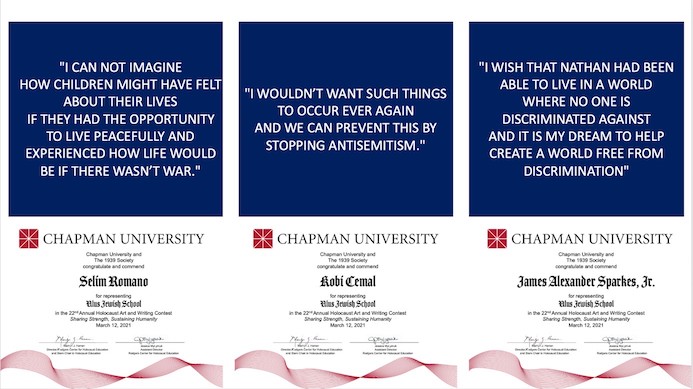
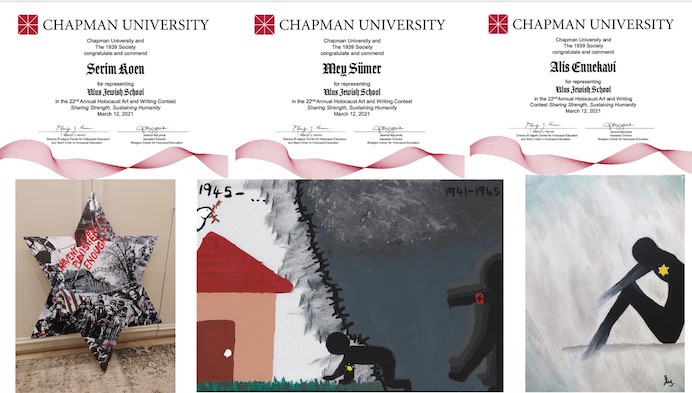
Students' certificates of Holocaust Art & Writing Competition
New York Sephardic Brotherhood
Another meaningful commemoration ceremony will be held by the New York Sephardic Brotherhood organization, on the evening of Sunday, April 11th, at 22:00 hrs. (Turkey time). At this commemoration ceremony about the Sephardic Jews killed during Holocaust, Rabbi Nissim Elnecavé who has family roots in Turkey, will make the opening speech. In the ceremony where the Ambassador of Greece to the United States of America, Alexandra Papadopoulou, the Senior Representative of Greek Orthodox Archdiocese of America, the Chief Rabbi of Italian Jewish Community Rabbi Ricardo Di Segni, the Greek Jewish Holocaust Survivor David Baruh, representative of World Jewish Congress Leon Saltiel will be present, and the memorial candle lighting ceremonies and memorial prayers will take place, I will also present my 'Sephardic Voices in Holocaust' concert together with my March of the Music student, ney artist, Eyüpcan Açıkpazu.
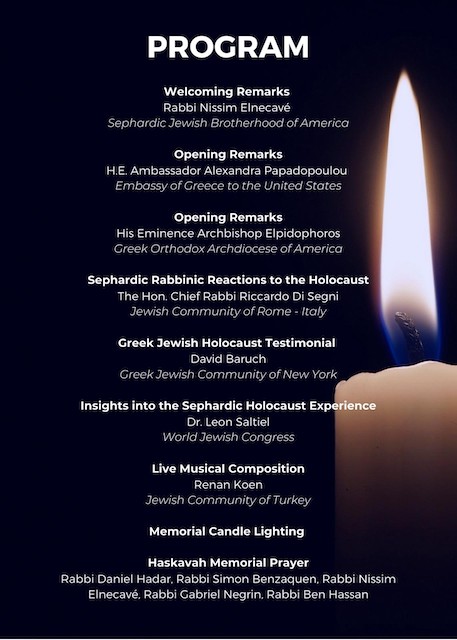
(1) USHMM Encyclopedia, Article "Auschwitz"
(2) Russo Family Archive "Kastoria 1944"
(3) United States Holocaust Memorial Museum, interview dated 29 January 1998
(4) Joe Halio, Stuart Fishelson, Sidney Gerson “Birkenau Memories of an Eyewitness How 72.000 Greek Jews Perished, Albert Menache, M.D.”
(5) Russo Family Archive "Lena & Maurice Russo Wedding March 22, 1953"
Related News












